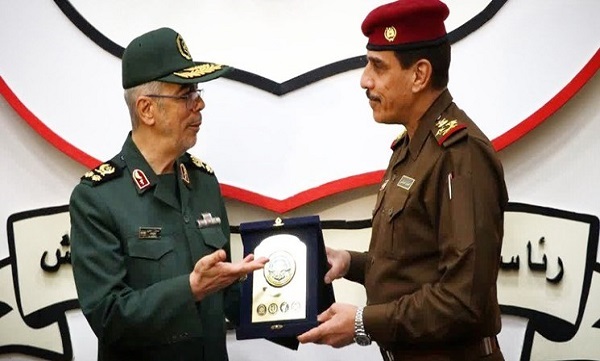Iran Underlines Necessity for Conducting Joint Military Exercise with Iraq
 During a meeting with Chief of the General Staff of the Iraqi Armed Forces Abdel Emir Rashid Yarallah in Baghdad on Sunday, Maj. Gen. Baqeri expressed Iran’s preparedness to confront any potential threats against Iraq’s territorial integrity and national sovereignty.
During a meeting with Chief of the General Staff of the Iraqi Armed Forces Abdel Emir Rashid Yarallah in Baghdad on Sunday, Maj. Gen. Baqeri expressed Iran’s preparedness to confront any potential threats against Iraq’s territorial integrity and national sovereignty.
Iran’s top general pointed to the various commonalities and good relations between the two neighboring countries, saying Iraq was moving on the path of growth and development concerning the stability and good security established in the Arab country.
“The two countries have good and valuable experience in the war against terrorism and can share their experience in a suitable format,” the military chief continued, adding, “The Islamic Republic of Iran was the only country that came to Iraq's aid against the Daesh [terrorist group], and the martyrs Haj Qassem Soleimani and Abu Mahdi Al-Muhandis are a precious legacy for the people of both countries.”
Lieutenant General Soleimani, his Iraqi trench mate Al-Muhandis, the second-in-command of Iraq’s PMU, and ten of their deputies were martyred by an armed drone strike that was directly ordered by the White House as their convoy left Baghdad International Airport on January 3, 2020. Both commanders were highly revered across the Middle East because of their key role in fighting the Daesh (also known as ISIL or ISIS) Takfiri terrorist group in the region, particularly in Iraq and Syria.
During the meeting, Baqeri also stressed the need for holding joint drills between Iranian and Iraqi militaries to ensure the lasting security of shared borders.
“The common borders of the two countries provide an opportunity to increase the convergence and benefits of both nations from mutual capacities,” he stressed.
The chief of staff of Iraq’s Army, for his part, expressed his gratitude to the Islamic Republic for its sincere cooperation in the fight against Daesh and honored the memory of Lieut. Gen. Soleimani.
Yarallah also announced the full readiness of the Iraqi armed forces for the development of military, defense, and training exchanges with Iran as well as joint exercises and sharing experience.
Following a series of meetings at various levels in both Iran and Iraq, Tehran and Baghdad reached a deal to disarm and relocate the terrorist groups based in Northern Iraq. Under the agreement, the Iraqi government has promised to disarm terrorist and separatist groups operating in the Kurdistan region, vacate their military barracks, and transfer them to the camps established by the Baghdad government.
Baghdad has pledged that it is committed to the security pact with Tehran and that anti-Tehran terrorists have been evacuated from the common borders and pushed back deep inside Iraqi soil. The Baghdad government has announced that the presence of Kurdish armed groups operating against Iran has been limited to five camps inside Iraq.
Iranian officials say the security pact between Tehran and Baghdad guarantees stability along both countries’ borders and serves as a logical and proper road map for the elimination of elements that create insecurity in the two countries and the entire region.
Tehran has repeatedly reiterated that President Seyed Ebrahim Rayeesi's foreign policy is built on good neighborliness. Iran’s officials say Tehran is willing to further bolster bilateral ties with its neighbors despite enemies' opposition.
Since late September 2022, the Islamic Revolution Guards Corps (IRGC) has launched a series of aerial operations on the headquarters of terrorist groups in Iraq’s semi-autonomous Kurdistan region. The military operation came after the illegal entry of armed teams linked with the Kurdish terrorist groups into the Iranian border cities in recent months.
The Permanent Mission of Iran to the UN had announced that diplomacy has failed to bring an end to the presence of terrorists in the Kurdistan region and the terror activities in the Arab country have left Tehran with no other option but to use military force against them.
The IRGC Ground Force has announced that the operations against terror bases will continue until all anti-Iran separatist and terrorist outfits holed up in the rugged mountainous area lay down their arms and surrender.
The Iranian Armed Forces, especially the IRGC, have repeatedly warned that they will never tolerate the presence and activity of terrorist groups along the Northwestern border and will give crushing and decisive responses in case of anti-security activities.
The IRGC has on countless occasions attacked and demolished terrorist hideouts in the Kurdistan region with artillery fire, missiles, and drones.
Military officials warn of Tehran’s continued attacks against the strongholds of anti-revolutionary groups in the region, especially the Iraqi Kurdistan region. They threatened the Americans that their bases in the region should also be abolished and not be used as an anti-revolutionary center.
